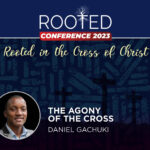A small body can obscure a big body. The size of the sun is almost 400 times the size of the moon, yet all it takes is the moon standing in the direct line of the sun for a solar eclipse to happen. A solar eclipse is a sad parable of the eclipse of the Son of God prevalent in many church pulpits throughout Africa today. Call it the “eclipse of Christ” in preaching. The full or partial shrouding of Jesus who is the “brightness of God’s glory” (Hebrews 1:3).
Many of us who preach often stand in the direct line of the Son or put things in the way that block those who “wish to see Christ” (John 12:21). The undue elevation of personalities, prosperity and possessions above Jesus—though these are much smaller and less luminous—proves this fact. There is a way to preach and teach about Jesus that simply conceals his brightness and majesty.
There’s a way to preach about Jesus that conceals his brightness and majesty.
Doctrines of angel worship were casting a shadow on the real glory of Jesus in the ancient church of Colossae (Colossians 2:18). It was taught there that Christ was a mere emanation and nothing more than a prominent angel among a panoply of angels. This veiling of Christ no doubt endangered the salvation and sanctification of the Colossians. Paul knew that sinners need to gaze (by faith) at the blazing glory of Jesus as the one who alone is “the light of the world” (John 9:5), in order to be saved. On the other hand, growth in holiness is a result of constantly beholding the unmasked glory of God in the face of Christ (2 Corinthians 3:8). As it was at Colossae, so it is today. There are many attempts to cover the majesty of Jesus.
We Have Nothing Better to Preach than Christ
Those who preach must never be party to the diminishment of Jesus.
Paul’s response in Colossians 1:15-20 might just be the richest Christological passage in the Bible. In it, we can extract the gains that consist in faithfully exposing people to the un-eclipsed Jesus, day after day. Those of us who preach must never be party to the ongoing diminishment of Jesus around us. In considering this passage, I’d like to highlight five reasons why we must be steadfast in preaching the glorious Christ from Colossians and the rest of scripture and a few attendant benefits.
1. Only Jesus Reveals God
Jesus is “the image of the invisible God” (Colossians 1:15a). The word “image” here carries the idea of likeness, representation, and manifestation. Since God is invisible (John 1:18; 1 John 4:12), it is only in Jesus that he is made visible. Jesus confirms this by declaring that “whoever has seen me has seen the Father” (John 14:9). In Jesus, “all the fullness of God dwells bodily” (Colossians 1:19; 2:9). He is therefore the full and final revelation of God to mankind (John 1:1, 12; Hebrews 1:1-2). The Father has ordained that we will only know him truly by knowing his Son.
Jesus is the full and final revelation of God to mankind.
When we fail to emphasise the divinity of Jesus in our preaching, we deny people an opportunity to truly know God. Those who hear us need to know that Jesus was more than a godly man; he is the God-man. The only way to the Father (John 14:6). Is there a chance that people will know God in our continent apart from how he wants to be known? No!
2. Preach Christ to Put the Devil in His Place
We also learn that he is the creator of all things. Things “in heaven and on earth, visible and invisible, whether thrones or dominions or rulers or authorities” (Colossians 1:16). All angelic beings—whether elect angels like Gabriel or evil angels like Satan and his minions—were made.
The devil needs Jesus to exist. The power gap between him and Jesus is infinite.
In a continent where the devil is mostly revered more than God (at least functionally), it’s important to remember that the devil is a creature. Jesus and Satan exist on different sides of the Creator-creature divide. As a creature, the devil has never made anything out of nothing, but Jesus created the world ex nihilo—out of nothing (Genesis 1:1-2). Jesus also sustains all creation “by the word of his power” (Hebrews 1:3). The devil needs Jesus to exist. The power gap between him and Jesus is infinite.
What if the preoccupation with Satan that many Christians in Africa have is because we rarely highlight the creatureliness of Satan and the absolute power of Christ over him?
3. Christ is the Head of His Church
Our Lord holds an unrivalled position in his church—both local and universal. “He is the head of the body, the church” (Colossians 1:18). This statement effectively dethrones any person or council from presumed headship over the church. Yes, Jesus mediates his rule over the church through qualified men (1 Timothy 5:17; Hebrews 13:17). But his singular, sovereign headship remains untouched. As the head, he is the ultimate source of vitality, instruction, and wisdom for his church. He rules the church by his sufficient word (2 Timothy 3:16-17), through his omnipotent Spirit (Romans 15:19).
Jesus is the ultimate source of vitality, instruction, and wisdom for his church.
Thus, those of us entrusted with leadership in the church are not to rule by fiat. We are just underlings. Our authority is delegated, not inherent. The way to resize people’s views of personalities in church leadership is to teach about Christ in the same terms that the apostles do.
4. Preaching Christ Sheds Light on the Afterlife
Christ is also the “the beginning, the first born from the dead” (Colossians 1:18b). His resurrection proves his decisive defeat of death (2 Timothy 1:10), having wrested all power from its hand (Hebrews 2:14). He also inaugurates the new creation. As the firstfruit from the dead, Jesus gives us a pattern for what awaits the Christian on the other side of death. At the resurrection, “we shall be like him” (1 John 3:2).
Christ’s resurrection proves his decisive defeat of death.
Our hope is not promotion to ancestorhood on the other side of death (as it’s taught in some of our African traditions), but to perfection like Jesus. We shall not spend eternity roaming as disembodied spirits, rather, we shall be clothed with immortal bodies (Philippians 3:21; see also 2 Corinthians 5:1-3).
5. Ours is a Gospel of Reconciliation
In his passion, Jesus commences the work of restoring harmony to the created order.
Lastly, it is through Christ that God “reconciles all things to himself…making peace by his blood” (Colossians 1:20). Due to the fall of man (Genesis 3:1-23), all of creation has been subjected to futility (Romans 8:20-21). In his passion, Jesus commences the work of restoring harmony to the created order. The effects of his work on the cross reverberate ‘far as the curse is found.’ However, this reconciliatory work is not just cosmic, it is personal. He also removes the hostility between God and any believing sinners by the blood of his cross.
The African needs not worry about giving blood sacrifices or diverse offerings to their tribal god in order to know peace. The Jesus who reveals the only true God, also reconciles us to him by his shed blood on the cross. That is enough.
Preacher, Make Much of Jesus
Since the church is the pyrotechnic display of God’s manifold wisdom to “rulers and authorities in the heavenly places” (Ephesians 3:10), shouldn’t the church also be the place where Jesus is seen and heard with the most clarity? Jesus makes much of the church and we ought to rightly make much of Jesus. The devil loves it when people are blocked from seeing the “light of the glory of Christ” (2 Corinthians 4:4), because then they continue to wallow in darkness.
Let’s not allow anything or anyone to stand in the way of this glorious Christ.
Fellow preachers, let’s not allow anything or anyone to stand in the way of this glorious Christ. Let’s preach him from all the Bible. This will multiply the benefits and the joy of our people (2 Corinthians 1:24). In the end, when people see Jesus clearly and hear about him rightly, they will believe and be eternally saved (Romans 10:13). What could be better?














